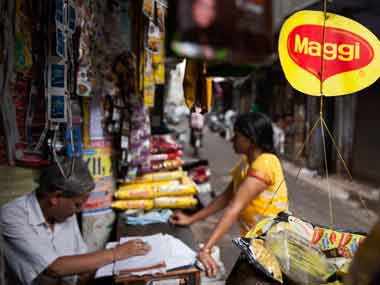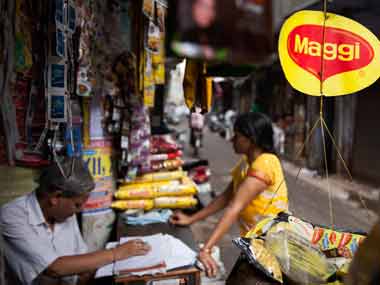The recent state action against Nestle’s Maggi noodles, where the chance discovery of packs that possibly contained a slight overdose of lead in Uttar Pradesh, has led to the product’s recall and the emptying of almost all retail shelves of all brands of instant noodles. This action, which has caused losses running into several hundred crores to business, is a classic example of the damage that can be done by a combination of tough laws and weak regulation. The weak state has struck again. That the UP food inspector, whose actions resulted in this massive recall is now being hailed as a minor hero who took on the might of the MNCs, tells us precisely what is wrong with the system. Almost farcically, both the inspector and his boss, Sanjay Singh and VK Pandey respectively, are now claiming credit for the damage done (read here). This is not to say they did wrong or that everything was all right with the Maggi samples that tested negative for existing food standards, but are they heroes just for doing their jobs? Especially when food regulators in the UK and Singapore have declared Maggi safe ? [caption id=“attachment_2339894” align=“alignleft” width=“380” class=" “]  AP image.[/caption] Two questions arise: if Maggi has been putting out sub-standard noodles targeted at children, why did it take the food inspection system 32 years to find out? Secondly, what is the point of having tough food safety standards if the system has no capacity to enforce them, and the first inspector who does so claims public accolades for the same? A system which needs individual heroics to implement the law will essentially be a corrupt one. Food Processing Minister Harsimrat Kaur thus needs applause for telling it like it is. In an interview to The Economic Times, she made it very clear that India may have cried wolf too soon with Maggi when it does not even have the basic infrastructure and manpower to test food samples at the Food Safety and Standards Authority of India (FS&SAI), which prompted the Maggi recall. Rather, she seemed to suggest that inspector raj was on the comeback trail. If this continues, we can forget Narendra Modi’s Make in India. We can’t expect anyone to make in India if those who are already doing so are going to be treated as suspects. She said: “In the name of food safety, you cannot bring back inspector raj, where inspectors are now beginning to harass the industry saying that they are getting tests done with some content found in their products.” As Harsimrat Kaur tells it, FS&SAI has all of six scientists doing the testing, and given the thousands of food product innovations that come for testing every year, it is clearly not upto the job on the scale required. The real problem of food safety lies not in our laws, but in our inability to create enough testing systems with adequate manpower to do the job consistently and fairly. We do not have a regulator who can regulate effectively. As a result, it is the oddball result – as in the case of Maggi – that is seen as a great achievement. Indian food is largely unsafe for human consumption. Toxic food is sold everywhere, from contaminated milk to fruits and vegetables that bear an overdose of pesticides, to bhujias that are simply unhealthy for all people, leave alone kids. Nowhere is the problem worse than in the case of milk – a product fundamental to Indian children’s health, especially those born in vegetarian families. Many producers and distributors adulterate milk to increase profits and to make the product look thick. In Maharashtra, the Food and Drug Administration found that 24 percent of the samples tested in Pune division were either unsafe or did not conform to the standards set by FS&SAI. But we continue to drink this poison in the name of health. Some diaries inject hormones or insulin into buffaloes because this helps make the milk thicker. But insulin also gets into the milk, which makes it unsafe for women and children. In Andhra Pradesh, milk samples tested by a private laboratory found traces of urea, coliform, e-coli and salmonella (many of them harmful bacteria), but the milk diaries faced no action. Unlike Maggi, which is being withdrawn at huge cost, how many milk producers have been ordered to throw their milk away because it is sub-standard? And it isn’t about milk alone. The New Delhi-based Centre for Science and Environment found that junk food – like burgers and bhujias – contains high levels of trans-fats (very harmful), salt and sugar, which could lead to problems like obesity, diabetes and heart disease. Most ordinary hotel kitchens are unhygienic, and street food is often sold next to gutters and garbage in big cities. Branded Kurkure may be made in hygienic factories, but potato chips and namkeen are often made inside slums or dirty factories, often with low-quality ingredients and oil, in order to sell them cheap. We pay a price in terms of health for buying and consuming “cheap” food. The short point is this: food and health safety, despite the existence of standards and regulations, is badly in need of strong supervision and enforcement of the law. It is easy to attack Maggi because it is produced by a multinational company, but the real health hazards can be found in food produced by the small sector, in hotels and in street food. It is here that our food regulators must start to look for violations of the law. The states are the real culprits, as food safety has to be enforced by them. The Maggi problem was discovered by a food inspector in Barabanki in Uttar Pradesh, but the chances are this discovery was an accident or an exception. The reason why bad and unhygienic food goes unchecked is corruption. It is simply too easy for food manufacturers to bribe inspectors and continue doing what they are doing: selling poison for profit. For small food sellers, the cost of complying with the law is simply too high compared with the ease of paying a bribe. There are only three ways to combat food adulteration. First, the public must be educated on this. Second, packaged food makers and hotels must be sensitised to improve hygiene standards by the use of better technology and safer ingredients. And third, we simply need many thousands of food inspectors all over the country and effective food regulators. Maggi is not the problem. The core issue is wayward implementation of the law enabled by a weak state that is unable to regulate firmly but fairly. Without holding any brief for Nestle or Maggi, is it anyone’s case that multinational corporations are less responsible than Indian food makers or the thousands of food vendors in the unorganised or retail sector? The answer should be obvious.
The ban on Maggi noodles tells what what is wrong with our food regulation. We are extolling the odd food recall as some kind of heroic act against bad MNCs when it is nothing of the kind.
Advertisement
End of Article
Written by R Jagannathan
R Jagannathan is the Editor-in-Chief of Firstpost. see more


)

)
)
)
)
)
)
)
)



